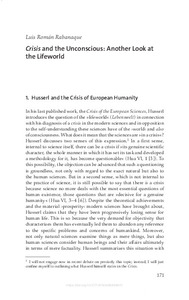Por favor, use este identificador para citar o enlazar este ítem:
https://repositorio.uca.edu.ar/handle/123456789/18339| Campo DC | Valor | Lengua/Idioma |
|---|---|---|
| dc.contributor.author | Rabanaque, Luis Román | es |
| dc.date.accessioned | 2024-06-27T10:19:36Z | - |
| dc.date.available | 2024-06-27T10:19:36Z | - |
| dc.date.issued | 2023 | - |
| dc.identifier.citation | Rabanaque, L. R. Crisis and the unconscious: another look at the lifeworld [en línea]. En: Inverso, H.-Schnell, A., (eds.). Crisis and Lifeworld. New Phenomenological Perspectives. Baden-Baden: Karl Alber, 2023. Disponible en: https://repositorio.uca.edu.ar/handle/123456789/18339 | es |
| dc.identifier.isbn | 978-3-495-99486-3 | - |
| dc.identifier.uri | https://repositorio.uca.edu.ar/handle/123456789/18339 | - |
| dc.description.abstract | In his last published work, the Crisis of the European Sciences, Husserl introduces the question of the »lifeworld« (Lebenswelt) in connection with his diagnosis of a crisis in the modern sciences and in opposition to the self-understanding these sciences have of the ›world‹ and also of consciousness. What does it mean that the sciences are »in a crisis«? Husserl discusses two senses of this expression.1 In a first sense, internal to science itself, there can be a crisis if »its genuine scientific character, the whole manner in which it has set its task and developed a methodology for it, has become questionable« (Hua VI, 1 [3]). To this possibility, the objection can be advanced that such a questioning is groundless, not only with regard to the exact natural but also to the human sciences. But in a second sense, which is not internal to the practice of science, it is still possible to say that there is a crisis because science no more deals with the most essential questions of human existence, those questions that are »decisive for a genuine humanity« (Hua VI, 3–4 [6]). Despite the theoretical achievements and the material ›prosperity‹ modern sciences have brought about, Husserl claims that they have been progressively losing sense for human life. This is so because the very demand for objectivity that characterizes them has eventually led them to abandon any reference to the specific problems and concerns of humankind... | es |
| dc.format | application/pdf | es |
| dc.language.iso | eng | es |
| dc.publisher | Karl Alber | es |
| dc.rights | Acceso restringido | * |
| dc.rights.uri | http://creativecommons.org/licenses/by-nc-sa/4.0/ | * |
| dc.source | En: Inverso, H.-Schnell, A., (eds.). Crisis and Lifeworld. New Phenomenological Perspectives. Baden-Baden: Karl Alber, 2023. | es |
| dc.subject | Husserl, Edmund, 1859-1938 | es |
| dc.subject | FILOSOFIA CONTEMPORANEA | es |
| dc.subject | CRISIS | es |
| dc.subject | FENOMENOLOGIA | es |
| dc.subject | CIENCIA | es |
| dc.title | Crisis and the unconscious: another look at the lifeworld | es |
| dc.type | Parte de libro | es |
| uca.disciplina | FILOSOFIA | es |
| uca.issnrd | 0 | es |
| uca.affiliation | Fil: Rabanaque, Luis Román. Universidad de Buenos Aires; Argentina | es |
| uca.affiliation | Fil: Rabanaque, Luis Román. Pontificia Universidad Católica Argentina; Argentina | es |
| uca.affiliation | Fil: Rabanaque, Luis Román. Consejo Nacional de Investigaciones Científicas y Técnicas; Argentina | es |
| uca.version | publishedVersion | es |
| item.fulltext | With Fulltext | - |
| item.languageiso639-1 | en | - |
| item.grantfulltext | mixedopen | - |
| crisitem.author.dept | Facultad de Filosofía y Letras | - |
| crisitem.author.dept | Departamento de Filosofía | - |
| crisitem.author.orcid | 0000-0003-0579-3807 | - |
| crisitem.author.parentorg | Pontificia Universidad Católica Argentina | - |
| crisitem.author.parentorg | Facultad de Filosofía y Letras | - |
| Aparece en las colecciones: | Libros/partes de libro | |
Ficheros en este ítem:
| Fichero | Descripción | Tamaño | Formato | Login |
|---|---|---|---|---|
| crisis-unconsciuous-lifeworld.pdf | 112,19 kB | Adobe PDF | SOLICITAR ACCESO | |
| crisis-unconscious-lifeworld.pdf | 46,63 kB | Adobe PDF |  Visualizar/Abrir |
Este ítem está sujeto a una Licencia Creative Commons

